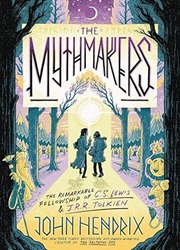
 The Mythmakers
The MythmakersThe Remarkable Fellowship of C. S. Lewis and J. R. R. Tolkien
Abrams Fanfare, 2024. 218 pages.
Review written December 4, 2024, from a library book.
Starred Review
2024 Sonderbooks Standout:
#1 Teen Nonfiction
This book will completely charm anyone who loves Narnia and Middle-earth.
Like John Hendrix's amazing book, The Faithful Spy, this is a full-on well-researched work of nonfiction, complete with an index. But the format is very visual. It's not quite a graphic novel - for one thing, it's not a novel, but there's also plenty of text (my one complaint is the teeny-tiny print used for most of that) giving background information. There are plenty of scenes with speech bubbles and panels, and there is some kind of picture on every spread. John Hendrix also used two characters - a wizard and a lion - to talk about the ideas that Tolkien and Lewis discussed.
I thought that was a strong point of the book. There are "portals" you can go through - referring you to a page at the back of the book - to get more in-depth information about "The Roots of Myth," "Origin of the Fairy Tale," "The Fantasists," and "The Artifact Attic."
Now besides these diversions, the wizard and the lion do a great job giving the reader the context of the two authors' lives, including how they both saw combat in World War I and lived to see World War II - so that greatly affected their world views and their writing. We also get the story of how C. S. Lewis lost his faith during the Great War - and later was "Surprised by Joy." Tolkien didn't convert him, but Tolkien loomed large in his life as a man of faith.
The highlight of the book is how it shows how much their friendship affected both their lives and their writing. There's a central chapter on the Inklings group they founded, and honestly I don't see how anyone could read it and not wish for a group like that themselves. And it shows how Tolkien and Lewis were the heart and leaders of the group.
There's also a contrast in their writing methods, though. Tolkien was slow, methodical, and perfectionist - working for decades on his magnum opus, The Silmarillion, which was finally published after his death. But this book makes the case that Lewis's encouragement may have been what helped Tolkien get The Hobbit and The Lord of the Rings published at all. Despite all his perfectionism, I'm still stunned to read that he didn't realize Bilbo's ring was the One Ring of Power until he got the hobbits to the inn at Bree. Sounds like he didn't exactly plan things out in advance.
On the other hand, Tolkien's comments on the beginning of The Lion, the Witch, and the Wardrobe almost prompted Lewis to throw the whole thing away! This book did, though, give me sympathy for his short-sightedness. I mean, if you've been spending your life painstakingly working out the background of your mythical world, and then you friend dashes off a story that combines talking animals and mythology and Father Christmas - well, I can understand that it's not quite Tolkien's thing. But I'm also super glad that Lewis found another reader to run the story past. He went on to write seven books about Narnia in seven years - a dramatically different pace than Tolkien published. Oh, another fun tidbit is that Ransom, the main character of Lewis's Space Trilogy, is based on Tolkien, and the books were written as the result of a coin flip - Tolkien was supposed to write a time travel book, but never completed it.
And the book also covers the way Tolkien and Lewis drifted apart in their later years. But the author indulges in a scene of the two reuniting after death, talking about how much they appreciate each other and how fortunate they were to have each other - before they "enter the west." In fact, after reading this book, I fully believe that the whole world is better because of their friendship and the books that would never have been quite the same if they hadn't found each other.
If you're at all a Lewis or Tolkien fan, get your hands on this book! I'm listing the book in Teen Nonfiction, but it's suitable for upper elementary and middle grade readers - as long as they're aware there's a whole lot of text. But yes, if they are a fan of either or both authors, this is a wonderful way to find out more and think about the ideas behind their work.
